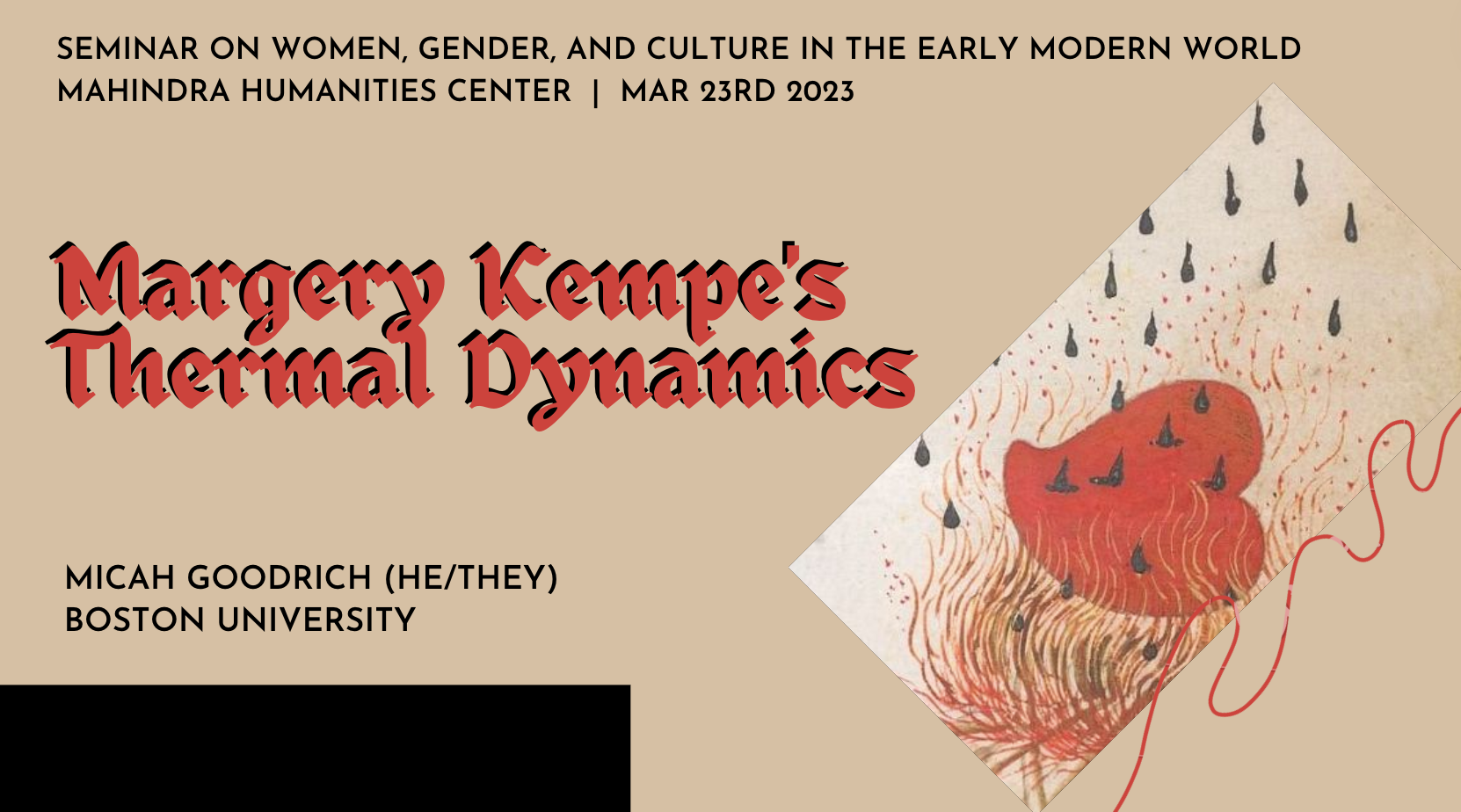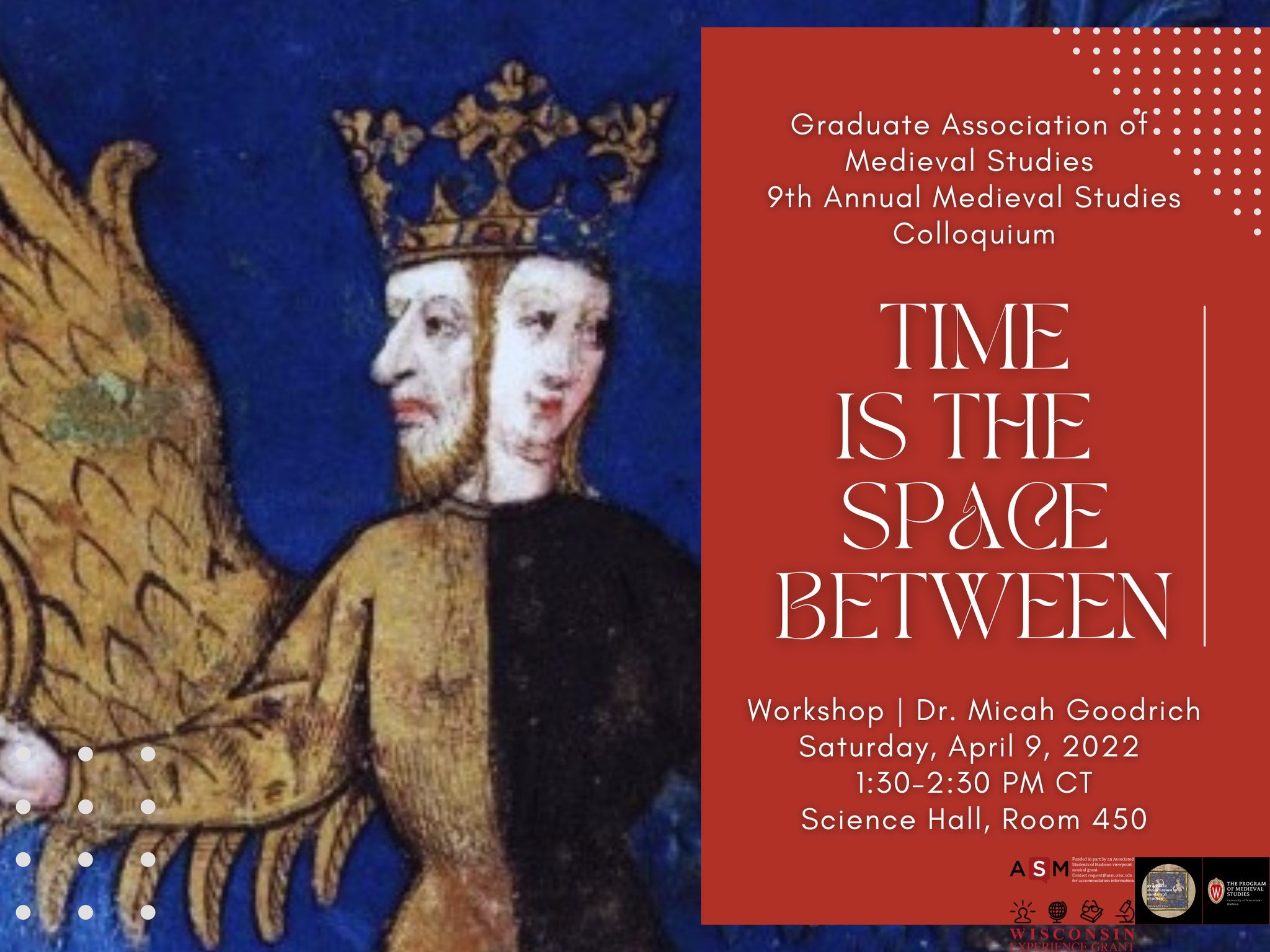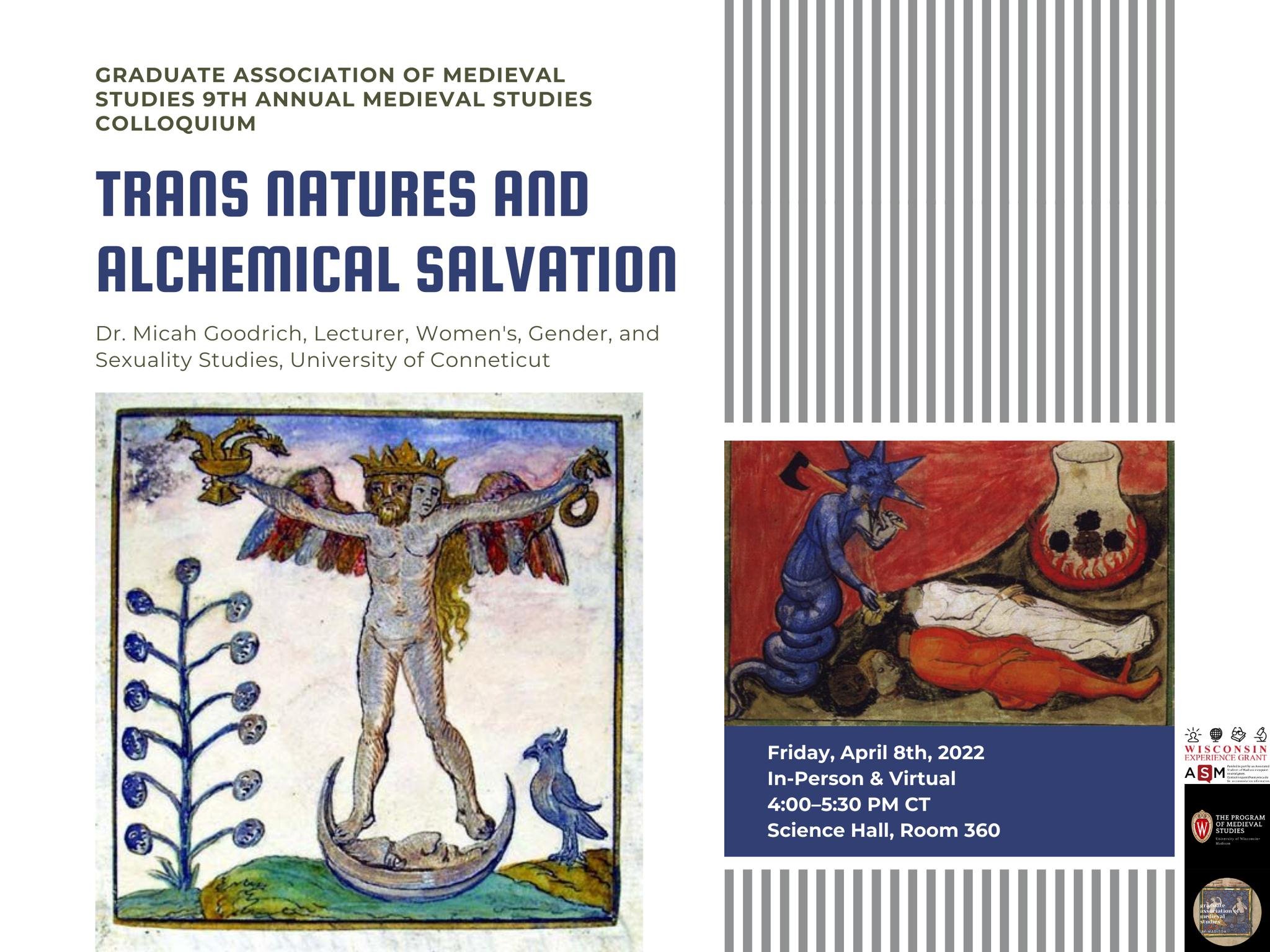
Reading the Pardoner Like Trans Readers
Medieval Studies Graduate Association (MSGA) Lecture, Cornell University
Micah Goodrich (Boston University), “Reading the Pardoner Like Trans Readers”
Date: Monday, April 14, 2025, Time TBD

He/Him/Hole: The Pardoner, Again
Pre and Early Modern Trans Studies Symposium
Micah Goodrich (Boston University), “He/Him/Hole: The Pardoner, Again”
Date: Tuesday, March 25, 2025 Time TBD

Trans Hermeneutics and the Pardoner's Holes: Beyond Mutilation
Critical Questions Lecture Series, Oregon State University
Micah Goodrich (Boston University), “Trans Hermeneutics and the Pardoner's Holes: Beyond Mutilation”
Date: Wednesday, February 12, 2025, 5:00pm to 6:30pm

The Future of Trans Studies
Join WGS for a discussion of Professor Rachel Mesch's Before Trans: Three Gender Stories from Nineteenth Century France, newly released in paperback.
Afterward, Professors Rachel Mesch and Micah Goodrich will lead an informal discussion on the field of trans studies. We invite students and faculty to bring ideas and questions about the kinds of topics and classes they would like to see added to the BU curriculum.
Folks who pre-register will be entered to win a free copy of the book!
Sponsored by Boston University’s Women’s, Gender, and Sexuality Studies Program and LGBTQIA+ Center for Faculty & Staff

Trans Hermeneutics and the End(s) of the Pardoner
Harvard University English Department Medieval Colloquium
Micah Goodrich (Boston University), “Trans Hermeneutics and the End(s) of the Pardoner”
Date: Thursday, April 4, 2024, 5:00pm to 6:30pm
Location: Barker Center 211

Margery Kempe’s Thermal Dynamics
Harvard University Mahindra Humanities Center Seminar on Women, Gender, and Culture in the Early Modern World
Micah Goodrich (Boston University), "Margery Kempe’s Thermal Dynamics"
Date: Thursday, March 23, 2023, 6:00pm
Location: Barker Center, Room 024, 12 Quincy St, Cambridge MA

9th Annual Medieval Studies Colloquium Workshop
This workshop is part of the Graduate Association of Medieval Studies (GAMS) 9th Annual Medieval Studies Colloquium. All GAMS Colloquium lectures and conference sessions are free and open to the public.
*Please note that these workshops are restricted to UW–Madison faculty, students, staff, and participants of the GAMS Colloquium.*
RSVP to Tania Kolarik at tkolarik@wisc.edu for the workshop's readings.
Workshop
Dr. Micah Goodrich, Lecturer, Women’s, Gender, and Sexuality Studies, University of Connecticut
Title: “Time is the Space Between”
Science Hall, Room 450
Abstract: In this workshop we will think through the middling space of between as a temporal, spatial, and embodied phenomenon. Medieval philosophers, artists, theologians, and authors conceptualized being in-between through various binaries: male/female, salvation/damnation, sacred/secular, human/animal, etc. New work in premodern trans and queer studies offers new ways of imagining a middling space, neither here nor there, and challenges the binaristic logics of both medieval thinkers and modern scholarship. We can consider the oscillating forces that moves bodies between and through time, space, language, and other mediums. How is the between or middle presented in visual, literary, or historical registers?
Dr. Goodrich's public lecture and workshop is sponsored by the Program in Medieval Studies, Department of Art History, Department of History, Department of English, Department of French & Italian, and the Department of German, Nordic, and Slavic +. This lecture and workshop is also funded in part by an Associated Students of Madison (ASM) viewpoint neutral grant and the Wisconsin Experience Grant (WEG). For accessibility accommodations, please contact: gams@rso.wisc.edu

9th Annual Medieval Studies Colloquium: Keynote
This lecture will be the second keynote lecture for the Graduate Association of Medieval Studies (GAMS) 9th Annual Medieval Studies Colloquium. All GAMS Colloquium lectures and conference sessions are free and open to the public.
Keynote Lecture
Dr. Micah Goodrich, Lecturer, Women’s, Gender, and Sexuality Studies, University of Connecticut
Title: “Trans Natures and Alchemical Salvation”
Science Hall, Room 360 and Virtual
Abstract: Medieval alchemists were interested in the salvific potential of creating the “Philosopher’s Stone” – a stone that, if created, would be filled with vitality – it could heal sickness, reproduce matter, and access the secrets of the divine. The alchemist’s final goal of creating the “Philosopher’s Stone” is rarely depicted in its metallic register. Instead, it is imagined as the “rebis,” a trans/nonbinary figure that represents both the presence of multiple fixed boundaries and binaries as well as the absence of these multiplicities. This lecture will discuss the trans animacy of alchemy’s magnum opus. Animacy is the discursive framing that shapes the conditions in which we apprehend something as animate or not and reveals the political ethics of alive-ness. It operates as an invisible mover of things, entities, and persons. Mel Chen’s recent work on animacy expands its queer and racialized dimensions to show how social attitudes creep into language to alter the agency of things. Expanding animacy through movement, trans animacy extends how life can cross between, through, and beyond seemingly fixed boundaries and binaries of animate/inanimate, male/female, alive/dead, hot/cold, etc. In medieval and early modern alchemy, the liveliness of compounds like sulfur and mercury are coded as male and female and when combined they (re)animate matter into new forms and functions. Alchemy reminds us that the act of being alive is most potent when matter is not reduced to being one thing but rather becoming many, multiple, and manifold.
Dr. Goodrich's public lecture and workshop is sponsored by the Program in Medieval Studies, Department of Art History, Department of History, Department of English, Department of French & Italian, and the Department of German, Nordic, and Slavic +. This lecture and workshop is also funded in part by an Associated Students of Madison (ASM) viewpoint neutral grant and the Wisconsin Experience Grant (WEG). For accessibility accommodations, please contact: gams@rso.wisc.edu.